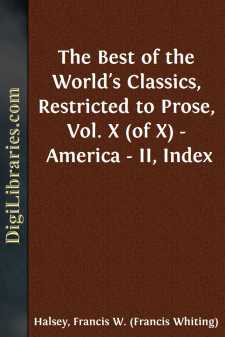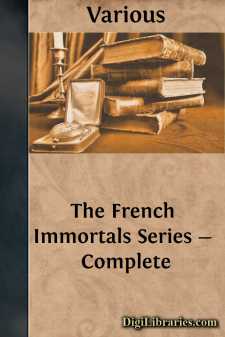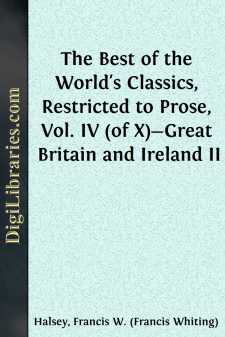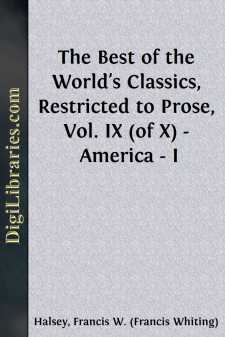Literary Collections
- American 84
- Ancient, Classical & Medieval 14
- Asian 1
- Australian & Oceanian 1
- Canadian 55
- Continental European 121
- English, Irish, Scottish, Welsh 179
- Essays 160
- General 24
- Letters 46
- Middle Eastern 1
Literary Collections Books
Sort by:
ABÉLARD BY THOMAS DAVIDSON ierre, the eldest son of Bérenger and Lucie (Abélard?) was born at Palais, near Nantes and the frontier of Brittany, in 1079. His knightly father, having in his youth been a student, was anxious to give his family, and especially his favorite Pierre, a liberal education. The boy was accordingly sent to school, under a teacher who at that time was making his mark in the...
more...
HENRY CUYLER BUNNER (1855-1896) The position which Henry Cuyler Bunner has come to occupy in the literary annals of our time strengthens as the days pass. If the stream of his genius flowed in gentle rivulets, it traveled as far and spread its fruitful influence as wide as many a statelier river. He was above all things a poet. In his prose as in his verse he has revealed the essential qualities of a...
more...
The cemetery of Père Lachaise is the Westminster Abbey of Paris. Both are the dwellings of the dead; but in one they repose in green alleys and beneath the open sky—in the other their resting place is in the shadowy aisle and beneath the dim arches of an ancient abbey. One is a temple of nature; the other a temple of art. In one the soft melancholy of the scene is rendered still more touching by the...
more...
by:
Various
CHAPTER I. THE HOUSE OF DESVARENNES The firm of Desvarennes has been in an ancient mansion in the Rue Saint Dominique since 1875; it is one of the best known and most important in French industry. The counting-houses are in the wings of the building looking upon the courtyard, which were occupied by the servants when the family whose coat-of-arms has been effaced from above the gate-way were still...
more...
BOSWELL'S INTRODUCTION TO DR. JOHNSON Mr. Thomas Davies the actor, who then kept a bookseller's shop in Russell street, Covent Garden, told me that Johnson was very much his friend, and came frequently to his house, where he more than once invited me to meet him; but by some unlucky accident or other he was prevented from coming to us. Mr. Thomas Davies was a man of good understanding and...
more...
OF COMPANIONS AND FLATTERERS An old acquaintance who met me this morning seemed overjoyed to see me, and told me I looked as well as he had known me do these forty years; but, continued he, not quite the man you were when we visited together at Lady Brightly's. Oh! Isaac, those days are over. Do you think there are any such fine creatures now living as we then conversed with? He went on with a...
more...
JOHN SMITH Born in England in 1579, died in 1631; served against the Turks, captured, but escaped and returned to England in 1605; sailed for Virginia in 1606, and helped to found Jamestown; captured by Indians and his life saved by Pocahontas the same year; explored the Chesapeake to its head; president of the Colony in 1608; returned to London in 1609; in 1614 explored the coast of New England;...
more...
INTRODUCTION Ever since civilized man has had a literature he has apparently sought to make selections from it and thus put his favorite passages together in a compact and convenient form. Certain it is, at least, that to the Greeks, masters in all great arts, we owe this habit. They made such collections and named them, after their pleasant imaginative fashion, a gathering of flowers, or what we,...
more...
THE TYRANNY OF THE AMERICAN MAJORITY I hold it to be an impious and execrable maxim that, politically speaking, the people has a right to do whatever it pleases; and yet I have asserted that all authority originates in the will of the majority. Am I then in contradiction with myself? A general law, which bears the name of justice, has been made and sanctioned not only by a majority of this or that...
more...
RICHARD DE BURY Born in 1281, died in 1345; the son of Sir Richard Aungerville, his own name being taken from his birthplace, Bury St. Edmonds; educated at Oxford, and became a Benedictine monk; tutor to Edward III; dean of Wells Cathedral in 1333; bishop of Durham the same year; high chancellor of England in 1334; founded a library at Oxford; his "Philobiblon" first printed at Cologne in 1473....
more...











